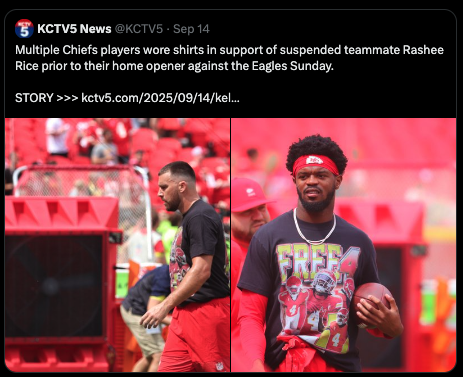T-Shirts Speak Loudly—What Are Yours Saying?
I actually really like Travis Kelce and his brother Jason. I have ZERO issue with him being Taylor Swift's fiancé (I love Taylor Swift) and I’m a big fan of Andy Reid’s creative mind.
What I do NOT like is the weaponization of what I’ve long trumpeted as the “TeamsOfMen guy”: the power of T-shirts.
Shirts are the quickest way to gauge someone’s beliefs and get someone to ask a question. Wear anything with a message or a picture and people will side-eye you and either agree, disagree, or ask. You’ve seen the faces. You’ve seen the smirks. You know I’m right. That’s why we sell the shirts we do.
But THIS shirt—“Free Rashee Rice”—while it absolutely states exactly what the Chiefs think about the NFL’s punishment of their teammate (for his offseason high-speed crash that led to a hit-and-run and jail sentence) reeks of something else entirely:
“Accountability feels like an attack when you’re not ready to accept responsibility.”
And it’s doubly silly for his TEAMMATES to wear it. They know what he did. They know he isn’t sitting in prison right now. They know he’s just missing four games (a relatively low bar of punishment for what could have been much worse). And they know he’ll be back running routes and catching touchdowns soon enough.
This goes past “have your brother’s back” and edges into something more dangerous:
“Being part of our team excuses you—or even enables you—to act a fool when you’re not in our uniform.”
Why not wear something like “Loving Rashee to Growth” or “Our Guy Will Be Better” and use THAT as the statement? Support doesn’t have to mean excuse.
Coach Prompts
What message do you send when your team rallies around a player in trouble—do your actions reinforce accountability or excuse it?
If your players wanted to wear a shirt like this in your program, how would you respond?
Do you create space for “support without excuse” in your locker room?
Player Prompts
What’s the difference between having someone’s back and excusing their harmful actions?
How would you want your teammates to show support if YOU were the one in trouble?
Can loyalty still mean accountability?


